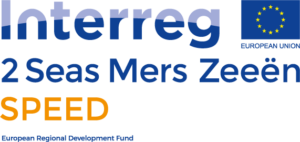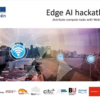The Interreg SPEED project is aimed at bridging the gap between the Data Science & IoT- market and the Western-European port market. The project’s research team is currently working on a diagnostic toolkit for supporting high-tech smart port focused entrepreneurs in their professionalization track. One of our project partners Startups.be introduced us to Wendy Geeraert, co- founder of Co-Libry, to talk about the struggles that come along with professionalizing starting tech-based companies. Through the (co-)foundation of both her companies, Enginity and Co-Libry, Wendy gathered some significant experience in the high-tech entrepreneurship field.
Co-Libry is an AI-based software service provider that offers solutions for real-estate platforms and websites such as data-capturing, enrichment, visualisation, and recommendation. The company puts a large emphasis on collaboration between their customers and themselves, which provides Co-Libry with a unique added value.
Investing time and effort is beneficial
Through her personal story, Wendy shared some valuable insights on the hurdles tech-based entrepreneurs face when it comes to professionalizing their business. A need for funds and time might not come as a surprise but remains a relevant subject throughout tech- based entrepreneurship. Many starting entrepreneurs generally find it a hassle to apply for funding programs when the chances of receiving a grant are slim. Wendy, however, strongly believes that putting in even a small effort, might end up more advantageous for the company in the long run. For Co-Libry’s growth track, for instance, she has managed to obtain a significant number of grants through an intermediate investment of effort. Effort is, of course, related to time. A lack of it is known to be a palpable everyday truth for entrepreneurs. The more a small start-up grows, the larger and more important its decisions become, the more money these decisions usually involve, and the more time it will need. The question has now shifted from having the time to investing the time to put in the effort for possible beneficial outcomes.
Gather relevant information
Essential at each stage of the company, and specifically when it comes to deciding what to invest time into, is information. At the start, this information is more general and thus, more easily attainable. At a later stage, however, such as during the professionalization of the business, more specific information is needed and at least the more general sources, will become a less efficient tool.
While starting up and trying to grow her company, Wendy relied mostly on a few distinct sources of information she found most useful. The internet, a mentor, and her network. The issue with the internet, however, is that the information is diverse and scattered, and a lack of time limits possibilities of maintaining this kind of sourcing throughout the growth of the company. Efficiency, relevance, and compactness of the information found or given is crucial for tech-based entrepreneurs to enable professionalization and later growth of their business.
We would like to thank Wendy Geeraerts at Co-Libry for taking the time to converse with us for the benefit of future tech-based companies and research purposes.
For further information on the Interreg SPEED diagnostic and improvement toolkit, please contact Morane Atzmon (morane.atzmon@uantwerpen.be) or Johanna Vanderstraeten (johanna.vanderstraeten@uantwerpen.be).
To find out more on Co-Libry, their product and their team, please visit their website.
To find out more about Startups.be, please visit our partner page.
This research project was carried out by Johanna Vanderstraeten, Sascha Albers, Rudy Martens and Morane Atzmon.
Johanna Vanderstraeten is assistant professor of (international) entrepreneurship, Sascha Albers is professor of international management, Rudy Martens is full professor of general and strategic management, and Morane Atzmon is Ph.D. candidate at the Faculty of Business and Economics of the University of Antwerp.
This research was supported by Startups.be and benefited from the funding of Interreg 2 Seas.




